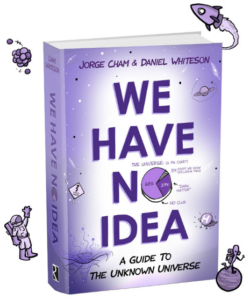Fleen Book Corner: We Have No Idea
It’s a good time for nonfiction books written by webcomickers — Kelly and Zach Weinersmith have Soonish: Ten Emerging Technologies That’ll Improve and/or Ruin Everything coming out, uh, soon-ish. Ryan North has something he’s working on along these lines that I can’t talk about yet. And Jorge Cham beat them all to the punch by partnering with actual particle physicist Daniel Whiteson to produce We Have No Idea: A Guide To The Unknown Universe, out now.
Cham asked me if I wanted a copy for review and it showed up at my doorstep about 47 hours later; Cham and Whiteson may claim to not know about the wider universe, but heck if they haven’t mastered negative-time shipping. I’ve been digging through WHNI since I received it and it is one hell of a sticky book¹. It’s also weirdly encouraging, as I’ve never felt so energized by accepting how little I know.
There’s a hell of a lot of mystery out there, from the smallest subatomic particles (Why are there as many as there are? Why do some appear not to be used for anything? Are there smaller particles inside them?) to the grandest cosmic scale (Dark matter: What is it? Why does it not interact with us? Why is there so much more Dark energy than dark matter, and in turn much more dark matter than ordinary matter like we’re familiar with?). Each gets explored in turn, laying out the limits of what we know and how much more we don’t².
Even better are the really weird questions that make you think Whiteson and Cham are just messing with us. For example, What is space? Hint: it’s not just the lack of stuff; best guess is that space is, itself, stuff, but not stuff as we know it. Lack of stuff doesn’t bend, or stretch, or wobble like space does; if you’re starting to get a headache³, just take a look at Cham’s cartoon that analogizes space as being sorta-kinda like Jell-O (they call it “space goo”, perhaps to avoid any unpleasant trademark issues4), it helps.
All of the cartoons help, in fact — key concepts can be gotten across remarkably quickly with a scribble or two in ways that pages of explanation (or mathematical formulae) just don’t get at. They’re funnier, too. It’s been a while since I read as broad a general-interest science book that I felt goat both the details (as required) and the big picture (without losing scope) as right as this one. It’s probably my favorite since A Brief History of Time, which had about 100% fewer cartoons and terrible puns.
It’s also more hopeful; no matter how much I enjoyed ABHOT, you can’t get past the point it’s by Stephen Freaking Hawking, Smartest Guy In History, and when he talks about mysteries and unknowns, the immediate reaction is Welp, we’ll never know.
Cham and Whiteson are clearly super smart (and between them, have at least two more PhDs than I ever finished), but their approach is infinitely playful, leaving the reader with an optimistic outlook of Sure, we don’t know now, but look how much we’ve figured out in basically an eyeblink of human history and if these two goofballs can explain it to me, imagine what all the really smart people in the world can determine!
Go get We Have No Idea, and catch the book tour if you possibly can. It’s the most uplifting description of ignorance ever, because now we (the humanity-wide we) realize how much is left to discover. Discovery’s the fun part; it’s like playtime for your brain.
Spam of the day:
Better than_Viagra? Tell-us-Where-to-Send your_Bottle!
Your product is called Phallyx? For real? Little on the nose there, don’t you think?
_______________
¹ I’d plowed through the first 120 or so pages when my neck began to hurt from hunching over it at a table with poor ergonomics; it took a couple hours to realize it.
² And that’s just the stuff we know we don’t know, never mind everything that we don’t even know we don’t know. Nevertheless, it’s as stirring a call to explore and discover and learn as I’ve read in a long damn time.
³ Alternately, reaching for your weed card and getting ready to gesture wildly and mutter Whoa.
4 An avoidance noticeably absent in their cavalier use of Lego and Legos in early chapters, thus potentially angering the international corporation most interested in ensuring that their trademarked term not ever become generic.
When the Danish assassins come, Cham and Whiteson and their copy editor will realize too late they should have referred to LEGO bricks (possibly with a few dozen ® and ™ trailing along).

The above comments are owned by whoever posted them. The staff of Fleen are not responsible for them in any way.